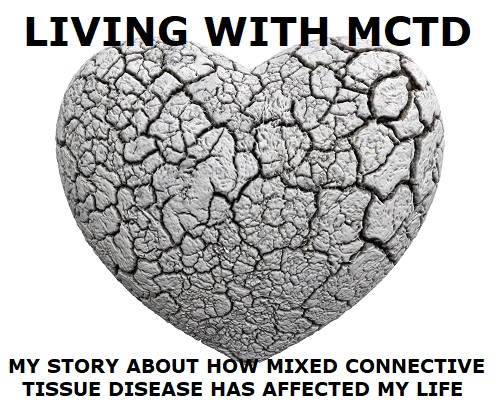Living With Mixed Connective Tissue Disease
 Living with chronic pain
Living with chronic pain
I am inclined to start the story of my diagnosis of MCTD and work backwards chronologically since this is the thread that ties everything together, or so I believe. But to give you a quick summary of the process, I have been dealing with chronic pain issues in my back and neck for as long as I can remember.
Working construction
I ended up working in construction from an early age and so the back pain was always attributed to working too hard, or I must have "tweaked something". This became such a regular state of being for me that I just learned to live with the pain. I learned how to work around it to whatever extent that is possible. In 2007 that came to an end for me when I could no longer maintain my day to day job of building swimming pools and I was forced to close my business. In 2014 I ceased working on pools, or working outside, completely.
Extensive medical testing
Throughout this period I have been pursuing traditional medical help. Many general practitioners, X-Rays, bone scans, pain clinics, chiropractors, physiotherapists, MRI's, nerve conduction studies, and more I am sure that I can't remember. In 2016 I had five MRI's alone on all different parts of my body. I am surprised I do not glow in the dark by now. For all of these years, spent seeing these different doctors, I can count on one hand how many times I felt that I was actually listened to, heard, and not rushed out of my appointment. Most people with MCTD tell a similar story and this is most likely due to the elusive nature of how MCTD manifests (differently) in people. If you have 30 different doctors listed in your medical charts, all chasing problems that go back decades, the newest one does not tend to put much stock in being able to help with your problems...or at least this is how it seems to the patient.
Wary of painkillers
I can not count how many times I was offered pain killers of every size, shape, and description. Since I have seen people who are addicted to pain killers before I am extremely wary of starting to take them. I hurt every day. So, I am offered a pill that takes that pain away, or at least to a noticeable degree...but don't overdo it, OK? How can you give a pill that takes pain away to a person who is in pain every day and tell them to not overdo it? I know me well enough to know in advance that I do not want to go down that road. It is easier I think to not take the first step than it would be to try to save myself after becoming addicted to opioids. If it was a means to an end, like an injury, then sure. But if you can not tell me what is wrong, or why I hurt, then painkillers sounds like a poor treatment plan to me. I am lucky enough that I can, for the most part, just bear the pain that MCTD brings to my life. I am not certain that it will always be this way, and for some, life without painkillers is simply not an option at all.
You adapt to living with pain
I know that I would for sure lose myself to them, and so I steadfastly do not accept any pain killers of any kind. My wife needs to fight with me to take an Advil once every few weeks when I am on the brink of madness from the pain...usually a migraine. I am a pro at ignoring body pain by now but that migraine pain will rock your world. Also, if I am honest, I feel that any acceptance of pain killers from the doctor would devalue my case with them. I fear I will be looked at like a drug seeking person. But then again, I also feel like I am looked at like, "if it were really that bad I would take the pain killers". I am not so sure about that. I have been told that I have a strong mind. I ignore things on a daily basis that I suspect would take down the average person from a full out run.
Changing your life around MCTD
Life is about adapting. I changed my life to accommodate what I was able to do well before I was diagnosed with MCTD. I figured out a way to start working from home. This is most likely the single best thing I have done to allow myself to control my surroundings, reduce certain stresses, reduce anxiety, and have time to care for myself properly. My ability to stay this way is in constant peril, as it is not easy to run a business, online or otherwise, when you have a disease that negatively affects you in so many ways. Perhaps this is a good point to get to the meat and potatoes of this story. I am sure everyone here reading, those with MCTD and those who want to learn more about it, want to know what the symptoms are...how it affects you. In a lot of ways. It's different for every person with MCTD, but here is what it is like for me:
Continue to the next page for the symptoms of MCTD

About the author - Steve Goodale is a blogger and technical specialist from Ontario Canada, winner of the 2018 Industry Leadership Award, who reaches over three million readers per year with his popular pool and spa blog. Steve started the www.CookForMeBaby.com blog about healthy eating after being diagnosed with a rare and incurable autoimmune disease. You can read more on his story about life with MCTD here. For more healthy cooking inspiration check out his other delicious recipes.
Copyright © 2018 - All Rights Reserved - www.CookForMeBaby.com
Template by OS Templates